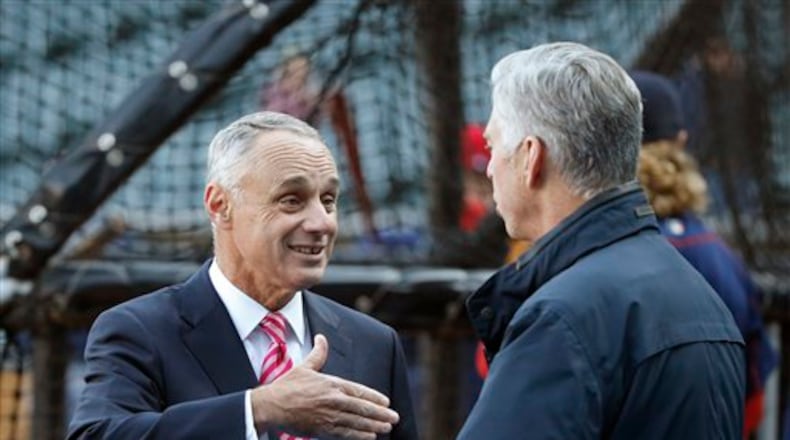With September call-ups clogging bullpens, managers have an easier time making late-game pitching changes, knowing they don't have to worry about running out.
That's certain to bug Commissioner Rob Manfred, who floated the idea of restricting the use of relievers in innings or games in order to speed things up.
"I am in favor of something like that," Manfred told ESPN in July. "We've spent a ton of time on this issue in the last few months. The problem with relief pitchers is that they're so good.
"I've got nothing against relief pitchers, but they do two things to the game: The pitching changes themselves slow the game down, and our relief pitchers have become so dominant at the back end that they actually rob action out of the end of the game, the last few innings of the game.
"So (restricting the usage of) relief pitchers is a topic that's under active consideration. We're talking about that a lot internally."
Manfred is thinking outside the box, usually a good thing in baseball where change tends to come at a glacier-like pace. But he seems to be obsessed with game times and increasing offense in an apparent attempt to get younger fans interested in baseball.
Giants pitching coach Dave Righetti is one of many veteran baseball observers who believes the game is fine just the way it is.
"They want to speed up the game and they want to score more at the same time?" Righetti asked before Saturday's Cubs-Giants game at Wrigley Field. "How do you manage that?"
Righetti, a baseball lifer, said you can't change the rules just because modern-day relievers are more talented than their predecessors. That's just the way the game has evolved.
"I'm sure in a general sense, watching as a fan, you see these great, hard young throwers come in and get these outs, you're probably going 'Oh, my God, our team doesn't have a chance,' " he said. "But you know how long that lasts. Most of the guys who throw that well don't do it very long. We've got a guy that has _ Joe Nathan _ but there are not many guys like that who can sustain (success) for a long time."
Keeping one reliever in the game just to avoid time-consuming pitching changes is, well, nuts _ and counterproductive to boot.
"If that means one guy has got to stay out there and take a beating, there's going to be more runs and the game is going to last even longer," Righetti said. "It's almost impossible to (implement.) How much more can you shorten it without killing so-called 'action?' We watched a 2-1 game (Friday at Wrigley Field) and it seemed like one of the best games of the year. Not for us, of course, but the fans didn't seem to mind it."
Rosters expand annually on Sept. 1, so teams don't have to worry as much about overusing their bullpens. But relievers can be overworked during the season, which can lead to arm injuries.
Righetti said he's in favor of a rule emulating hockey that would allow teams to carry a 26th player, with one player sitting out on game day. NHL teams have a 23-player active roster on game days, but only 20 are allowed to dress, with the others listed as healthy scratches.
"Decide how many guys you have active," he said. "Our starter pitched yesterday, and so today he shouldn't be on the (active) list and we can use another reliever."
Manfred talked about banning defensive shifts in his first year on the job, though he seemed to backtrack on that one after hearing criticism. Righetti doesn't believe that would work either.
"What's defined as a shift?" he said. "Just because you move a second baseman into right field, is he shifting? A shift is if a guy changes from one side of the base to the other. Willie McCovey was one of the great power hitters of all time, and playing the Mets he said they sometimes had four outfielders to cover the gaps. Now that's a shift."
Righetti understands baseball's deep thinkers are just trying to help the game grow, which means getting the kids to become fans and remain fans.
"They want their game to obviously be exciting but not too long," he said. "They're trying to put a clock on everything, They train the kids in the minors, which is a great idea. Get guys in tune to get on the mound and throw. It will get ingrained in them in the minors and get things moving, and there's nothing wrong with that."
In short: Change is good. Too much change? Not good.
About the Author
Keep Reading
The Latest
Featured



